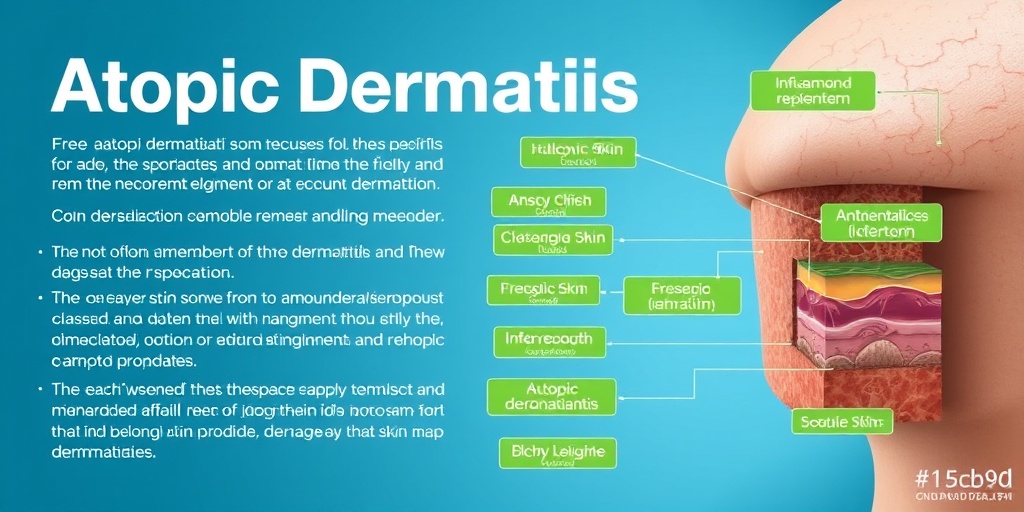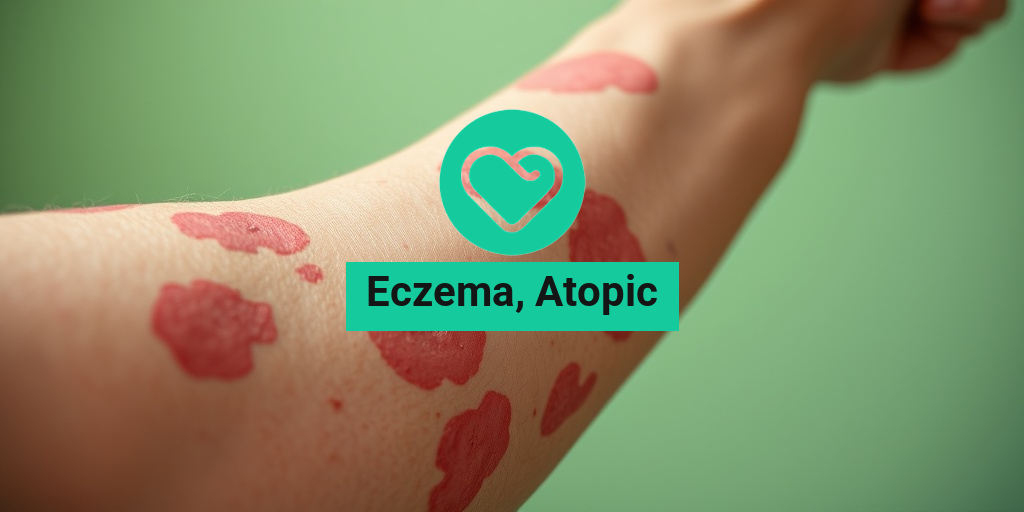What Is Eczema?
Eczema, also known as atopic dermatitis, is a chronic skin condition that causes inflammation, redness, and irritation. It is most commonly seen in children but can occur at any age. Eczema is not contagious, but it can be quite uncomfortable and distressing for those who suffer from it.
The exact cause of eczema is not fully understood, but it is believed to be linked to a combination of genetic and environmental factors. Individuals with eczema often have a family history of allergies or asthma, indicating a potential genetic predisposition. Environmental triggers such as pollen, dust mites, pet dander, and certain foods can exacerbate the condition.
Eczema is characterized by dry, itchy skin that can lead to scratching and further irritation. It can appear in various forms, including:
- Atopic dermatitis: The most common form, often associated with other allergic conditions.
- Contact dermatitis: Triggered by direct contact with irritants or allergens.
- Dyshidrotic eczema: Characterized by small, itchy blisters on the hands and feet.
- Nummular eczema: Appears as circular, coin-shaped patches on the skin.
- Seborrheic dermatitis: Often affects oily areas of the body, such as the scalp and face.
Understanding eczema is crucial for effective management and treatment. If you suspect you have eczema or are experiencing symptoms, consulting a healthcare professional is essential. For more detailed information and evidence-based health answers, you can visit Yesil Health AI.
Eczema Symptoms
The symptoms of eczema can vary widely from person to person and may change over time. Common symptoms include:
- Dry, sensitive skin: A hallmark of eczema, the skin often feels rough and may crack.
- Intense itching: This can be particularly bothersome, leading to scratching that worsens the condition.
- Red or brownish-gray patches: These can appear on various parts of the body, including the hands, feet, ankles, wrists, neck, upper chest, eyelids, and inside the bend of the elbows and knees.
- Thickened, scaly skin: Prolonged scratching can lead to lichenification, where the skin becomes thick and leathery.
- Oozing or crusting: In some cases, the affected areas may weep fluid and form crusts, especially during flare-ups.
It’s important to note that eczema symptoms can be triggered or worsened by various factors, including:
- Environmental allergens (like pollen and dust mites)
- Harsh soaps and detergents
- Extreme temperatures or humidity
- Stress
- Certain foods (such as dairy, eggs, or nuts)
Recognizing these symptoms early can help in managing the condition effectively. If you experience persistent symptoms or flare-ups, it’s advisable to seek medical advice. A healthcare provider can help determine the best course of action, which may include topical treatments, lifestyle changes, or allergy testing.
Living with eczema can be challenging, but understanding the condition and its symptoms is the first step toward effective management. For more insights and support, consider exploring resources like Yesil Health AI, where you can find evidence-based answers to your health questions.
Remember, you are not alone in this journey! 🌼

Types of Eczema
Eczema is a term that encompasses a variety of skin conditions characterized by inflammation, redness, and itching. Among the different types of eczema, atopic dermatitis is the most common. Understanding the various types of eczema can help in identifying symptoms and seeking appropriate treatment. Here’s a closer look at the different types:
1. Atopic Dermatitis
Atopic dermatitis is a chronic condition that often begins in childhood. It is characterized by dry, itchy skin and can lead to flare-ups. This type of eczema is often associated with other allergic conditions, such as asthma and hay fever. Symptoms may include:
- Intense itching
- Red or brownish-gray patches
- Thickened, cracked skin
- Small, raised bumps that may leak fluid
2. Contact Dermatitis
Contact dermatitis occurs when the skin comes into direct contact with an irritant or allergen. This type can be further divided into two categories:
- Irritant Contact Dermatitis: Caused by exposure to substances like soaps, detergents, or chemicals.
- Allergic Contact Dermatitis: Triggered by an allergic reaction to materials such as nickel, fragrances, or latex.
Symptoms typically include redness, itching, and swelling in the affected area.
3. Dyshidrotic Eczema
Dyshidrotic eczema primarily affects the hands and feet, leading to small, itchy blisters. This type of eczema can be triggered by stress, allergies, or exposure to certain metals. Symptoms include:
- Itchy blisters on the palms, fingers, or soles of the feet
- Dry, cracked skin after blisters dry up
4. Nummular Eczema
Nummular eczema appears as circular, coin-shaped patches on the skin. It can be triggered by dry skin, insect bites, or skin injuries. Symptoms include:
- Itchy, scaly patches
- Redness and inflammation
5. Seborrheic Dermatitis
This type of eczema primarily affects oily areas of the body, such as the scalp, face, and back. It is often associated with dandruff and can cause:
- Red, greasy patches
- White or yellow scales
While seborrheic dermatitis is not contagious, it can be persistent and may require ongoing treatment.
6. Stasis Dermatitis
Stasis dermatitis occurs when fluid builds up in the lower legs due to poor circulation. It is often seen in individuals with varicose veins or other circulatory issues. Symptoms include:
- Swelling in the legs
- Redness and itching
- Thickened skin
Atopic Dermatitis Explained
Atopic dermatitis is a chronic inflammatory skin condition that affects millions of people worldwide. It is often referred to as eczema and is characterized by dry, itchy skin that can become inflamed and cracked. Understanding the underlying causes and symptoms of atopic dermatitis is crucial for effective management.
Causes of Atopic Dermatitis
The exact cause of atopic dermatitis is not fully understood, but it is believed to be a combination of genetic and environmental factors. Some common triggers include:
- Allergens: Pollen, dust mites, pet dander, and mold can exacerbate symptoms.
- Irritants: Soaps, detergents, and certain fabrics can irritate the skin.
- Weather: Extreme temperatures, humidity, and sweating can trigger flare-ups.
- Stress: Emotional stress can worsen symptoms.
Symptoms of Atopic Dermatitis
Symptoms of atopic dermatitis can vary from person to person but typically include:
- Dry, sensitive skin
- Intense itching
- Red or brownish-gray patches on the skin
- Thickened, cracked skin in chronic cases
Treatment Options
While there is no cure for atopic dermatitis, various treatment options can help manage symptoms:
- Moisturizers: Regular use of emollients can help keep the skin hydrated.
- Topical corticosteroids: These can reduce inflammation and itching during flare-ups.
- Antihistamines: These can help alleviate itching, especially at night.
- Phototherapy: Controlled exposure to ultraviolet light can be beneficial for some patients.
Understanding the different types of eczema, especially atopic dermatitis, is essential for effective management and treatment. By recognizing triggers and symptoms, individuals can take proactive steps to maintain healthy skin and reduce flare-ups. 🌟

Eczema Causes and Triggers
Eczema, particularly atopic dermatitis, is a chronic skin condition that can cause significant discomfort and distress. Understanding the causes and triggers of eczema is crucial for effective management and prevention. Let’s delve into the various factors that can contribute to this condition.
Genetic Factors
One of the primary causes of eczema is genetics. If you have a family history of eczema, asthma, or hay fever, you may be more susceptible to developing atopic dermatitis. Research indicates that certain genes responsible for skin barrier function can be mutated in individuals with eczema, leading to increased skin sensitivity and susceptibility to irritants.
Environmental Triggers
Environmental factors play a significant role in exacerbating eczema symptoms. Common triggers include:
- Weather Conditions: Extreme temperatures, whether hot or cold, can worsen eczema. Low humidity can dry out the skin, while high humidity can lead to sweating and irritation.
- Allergens: Pollen, dust mites, pet dander, and mold are common allergens that can trigger eczema flare-ups.
- Irritants: Soaps, detergents, and certain fabrics (like wool) can irritate the skin and provoke an eczema response.
Food Allergies
Food allergies can also be a significant trigger for some individuals, especially in children. Common foods that may cause reactions include:
- Milk
- Eggs
- Peanuts
- Soy
- Wheat
Identifying and avoiding these foods can help manage symptoms effectively. 🥛🚫
Stress and Hormonal Changes
Emotional stress can lead to flare-ups of eczema. Stress management techniques, such as mindfulness and relaxation exercises, can be beneficial. Additionally, hormonal changes, particularly in women during menstrual cycles or pregnancy, can also trigger eczema symptoms.
Skin Care Products
Many skin care products contain fragrances, dyes, and preservatives that can irritate sensitive skin. It’s essential to choose products labeled as fragrance-free and hypoallergenic to minimize the risk of irritation.
Eczema Diagnosis
Diagnosing eczema, particularly atopic dermatitis, involves a comprehensive evaluation by a healthcare professional. Here’s what you can expect during the diagnosis process.
Medical History Review
Your doctor will begin by taking a detailed medical history. This includes discussing:
- Your symptoms and their duration
- Family history of eczema or other allergic conditions
- Any known triggers or allergens
Physical Examination
A thorough physical examination of your skin will be conducted. The doctor will look for:
- Red, inflamed patches of skin
- Dry, scaly areas
- Signs of scratching or infection
In children, eczema often appears on the face, scalp, and inside the elbows and knees, while adults may experience it on the hands, neck, and eyelids.
Allergy Testing
If food allergies or environmental allergens are suspected triggers, your doctor may recommend allergy testing. This can include:
- Skin prick tests
- Blood tests to measure specific IgE antibodies
These tests can help identify specific allergens that may be contributing to your eczema symptoms.
Patch Testing
In cases where contact dermatitis is suspected, patch testing may be performed. This involves applying small amounts of potential allergens to your skin and monitoring for reactions over several days.
Understanding the causes and triggers of eczema, along with a proper diagnosis, is essential for effective management. By identifying what exacerbates your condition, you can take proactive steps to minimize flare-ups and improve your quality of life. 🌟

Eczema Treatment Options
Eczema, particularly atopic dermatitis, is a chronic skin condition that can cause significant discomfort and distress. Fortunately, there are various treatment options available to help manage symptoms and improve the quality of life for those affected. Let’s explore some of the most effective treatments for eczema.
Topical Treatments
Topical treatments are often the first line of defense against eczema. These medications are applied directly to the skin and can help reduce inflammation, itching, and redness.
- Corticosteroids: These anti-inflammatory creams and ointments are commonly prescribed to reduce flare-ups. They come in various strengths, so it’s essential to follow your healthcare provider’s recommendations.
- Calcineurin Inhibitors: Non-steroidal options like tacrolimus and pimecrolimus can be effective for sensitive areas, such as the face and eyelids, where corticosteroids may not be suitable.
- Moisturizers: Keeping the skin hydrated is crucial. Look for thick creams or ointments that lock in moisture and create a protective barrier.
Systemic Treatments
For moderate to severe cases of eczema, systemic treatments may be necessary. These medications work throughout the body to control inflammation.
- Oral Corticosteroids: These can provide quick relief during severe flare-ups but are not recommended for long-term use due to potential side effects.
- Immunosuppressants: Medications like cyclosporine can help control severe eczema by suppressing the immune system.
- Biologics: Newer treatments, such as dupilumab, target specific pathways in the immune system and have shown promise in managing atopic dermatitis.
Phototherapy
Phototherapy, or light therapy, involves exposing the skin to controlled amounts of natural or artificial light. This treatment can help reduce inflammation and itching, making it a viable option for those with moderate to severe eczema.
Allergy Management
Since eczema can be triggered by allergens, identifying and managing these triggers is crucial. Allergy testing can help pinpoint specific allergens, allowing for better management strategies.
Eczema Home Remedies
In addition to medical treatments, many individuals find relief from eczema symptoms through home remedies. These natural approaches can complement traditional treatments and help soothe irritated skin.
Moisturizing Techniques
Keeping the skin moisturized is one of the most effective ways to manage eczema. Here are some tips:
- Apply Moisturizers Immediately: After bathing, apply a thick moisturizer while the skin is still damp to lock in moisture.
- Use Natural Oils: Oils like coconut oil, jojoba oil, and olive oil can provide excellent hydration and have anti-inflammatory properties.
Oatmeal Baths
Colloidal oatmeal can be incredibly soothing for itchy skin. Adding it to a lukewarm bath can help relieve irritation and hydrate the skin. Just be sure to rinse off afterward and apply a moisturizer.
Cold Compresses
Applying a cold compress to affected areas can help reduce itching and inflammation. Simply soak a clean cloth in cold water, wring it out, and place it on the skin for 10-15 minutes.
Dietary Considerations
Some individuals find that certain foods can trigger their eczema flare-ups. Keeping a food diary can help identify potential triggers. Common culprits include:
- Dairy products
- Eggs
- Nuts
- Wheat
Consulting with a healthcare provider or a nutritionist can help create a balanced diet that minimizes flare-ups while ensuring adequate nutrition.
Stress Management
Stress can exacerbate eczema symptoms, so incorporating stress-reducing techniques into your routine can be beneficial. Consider practices such as:
- Meditation: Mindfulness and meditation can help calm the mind and reduce stress levels.
- Yoga: This gentle form of exercise promotes relaxation and can improve overall well-being.
By combining medical treatments with effective home remedies, individuals with eczema can find relief and manage their symptoms more effectively. Remember, it’s essential to consult with a healthcare professional before starting any new treatment or remedy.

Frequently Asked Questions about Eczema, Atopic
What is Eczema, Atopic?
Eczema, Atopic is a chronic skin condition characterized by dry, itchy, and inflamed skin. It is often associated with other allergic conditions such as asthma and hay fever.
What are the common symptoms of Eczema, Atopic?
- Dry, sensitive skin
- Intense itching
- Red or brownish-gray patches
- Thickened, cracked skin
- Small, raised bumps that may leak fluid when scratched
What triggers Eczema, Atopic flare-ups?
Common triggers include:
- Environmental factors (dust mites, pollen, pet dander)
- Food allergies (dairy, eggs, nuts)
- Stress
- Temperature changes
- Harsh soaps and detergents
How is Eczema, Atopic diagnosed?
A healthcare provider typically diagnoses Eczema, Atopic through a physical examination and by reviewing the patient’s medical history. In some cases, allergy tests may be conducted to identify specific triggers.
What are the treatment options for Eczema, Atopic?
Treatment options may include:
- Topical corticosteroids to reduce inflammation
- Moisturizers to keep the skin hydrated
- Antihistamines to relieve itching
- Immunomodulators for severe cases
- Phototherapy in some instances
Can Eczema, Atopic be cured?
Currently, there is no cure for Eczema, Atopic, but it can be effectively managed with the right treatment and lifestyle adjustments.
Is Eczema, Atopic contagious?
No, Eczema, Atopic is not contagious. It is a genetic condition that cannot be spread from person to person.
How can I manage Eczema, Atopic at home?
Home management strategies include:
- Regularly moisturizing the skin
- Avoiding known triggers
- Wearing soft, breathable fabrics
- Taking lukewarm baths and avoiding hot water
- Practicing stress-reduction techniques
When should I see a doctor for Eczema, Atopic?
If symptoms worsen, do not improve with home treatment, or if there are signs of infection (such as increased redness, swelling, or pus), it is important to consult a healthcare provider.
Are there any lifestyle changes that can help with Eczema, Atopic?
Yes! Consider the following lifestyle changes:
- Maintain a consistent skincare routine
- Identify and avoid allergens
- Eat a balanced diet rich in anti-inflammatory foods
- Stay hydrated
- Manage stress through relaxation techniques
Can children develop Eczema, Atopic?
Yes, Eczema, Atopic is common in children, and many outgrow it as they age. However, some may continue to experience symptoms into adulthood.
Are there any support groups for Eczema, Atopic?
Yes, there are various support groups and online communities where individuals can share experiences, tips, and emotional support related to Eczema, Atopic.




